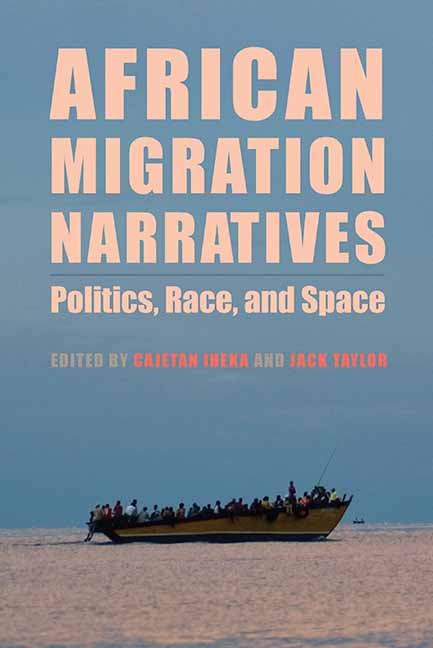Book contents
- Frontmatter
- Contents
- Acknowledgments
- Introduction: The Migration Turn in African Cultural Productions
- Part One African Migration on the Screen: Films of Migration
- Part Two Forgotten Diasporas: Lusophone and Indian Diasporas
- 5 Mami Wata, Migrations, and Miscegenation: Transculturalism in José Eduardo Agualusa, Mia Couto, and Germano Almeida
- 6 Poor Migrant: Poverty and Striving in Nadine Gordimer's July's People and The Pickup
- 7 Reimaging Blackness in a Hybridized and Racialized Space: The Visual Landscapes of the Peruvian District of El Carmen, Chincha
- Part Three Migration against the Grain: Narratives of Return
- Part Four Migration and Difference: Indigeneity, Race, Religion, and Poetry at the Margins
- Bibliography
- Notes on Contributors
- Index
6 - Poor Migrant: Poverty and Striving in Nadine Gordimer's July's People and The Pickup
from Part Two - Forgotten Diasporas: Lusophone and Indian Diasporas
Published online by Cambridge University Press: 26 July 2019
- Frontmatter
- Contents
- Acknowledgments
- Introduction: The Migration Turn in African Cultural Productions
- Part One African Migration on the Screen: Films of Migration
- Part Two Forgotten Diasporas: Lusophone and Indian Diasporas
- 5 Mami Wata, Migrations, and Miscegenation: Transculturalism in José Eduardo Agualusa, Mia Couto, and Germano Almeida
- 6 Poor Migrant: Poverty and Striving in Nadine Gordimer's July's People and The Pickup
- 7 Reimaging Blackness in a Hybridized and Racialized Space: The Visual Landscapes of the Peruvian District of El Carmen, Chincha
- Part Three Migration against the Grain: Narratives of Return
- Part Four Migration and Difference: Indigeneity, Race, Religion, and Poetry at the Margins
- Bibliography
- Notes on Contributors
- Index
Summary
African migration is putatively the subject of the hypnotic track “Boat Journey” by Tony Allen, Fela Kuti's celebrated drummer and collaborator in the creation of Afrobeat. Since the 1960s, Afrobeat has been one of the primary expressive modes through which Africa's realities have been urgently imagined and interpreted. In “Boat Journey,” Allen continues this tradition of social commentary with migration as its subject matter. “Boat Journey” appears on Allen's 2014 album Film of Life. Its lyrics depict African migrants traveling desperately, if fruitlessly, in search of a better future: “Now you jump into the boat / To cruise the ocean with all your family / Lookin lookin’ for better situation across the ocean / But you never arrive / Don't take the boat journey, my brothers! / Don't take the boat journey, my sisters!” The lyrics, presented in Allen's voice and anchored by his famed drumming, exhort the migrants against a fraught journey that begins in “running away from misery” but ends tragically in “never arriv[ing].” These lyrics of dreadful migrant fates foretold acquires fresh piquancy when we remind ourselves that Allen was born in Lagos, Nigeria, but now lives in Paris, France—surely, migration is experienced differently depending on who is migrating and for what purpose.
The urgency of this theme of migration is also signaled by Borders, the 2015 music video by artistic provocateur MIA. Performed and directed by MIA, this remarkable video echoes Allen in multiple ways. It presents humanity on the move—on boats across the ocean, in long files across a barren landscape, clambering over fences. MIA's own background includes arriving in Britain as a Tamil refugee to escape the political violence in Sri Lanka. Given that the video was released a few months after the summer of 2015, it would make sense for us to interpret it as a comment on the flood of migrants flowing across the Mediterranean during that summer from Africa, Syria, and farther afield.
However, MIA's video does not specify a reason why the racially ambiguous migrants featured in the video are on the move. Indeed, I would argue that the power of the video lies precisely in not focusing on a single cause. Are the migrants fleeing war? political repression? poverty?
- Type
- Chapter
- Information
- African Migration NarrativesPolitics, Race, and Space, pp. 101 - 113Publisher: Boydell & BrewerPrint publication year: 2018

